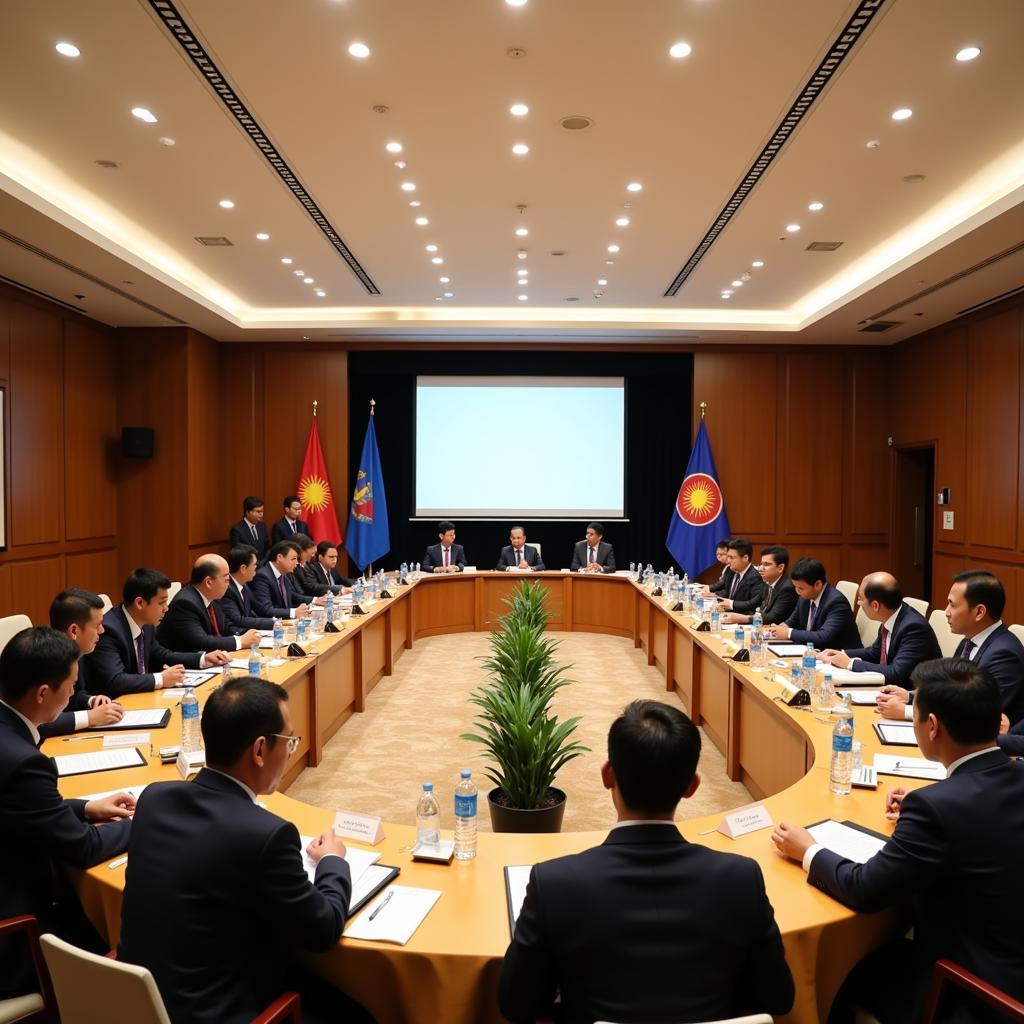The Association of Southeast Asian Nations (ASEAN) Intergovernmental Commission on Human Rights (AICHR) stands as a testament to the region’s growing commitment to human rights. Established in 2009, the AICHR embodies ASEAN’s collective aspiration to promote and protect human rights and fundamental freedoms for its people. This article delves into the core functions, achievements, and challenges faced by the Asean Aichr as it navigates the complex landscape of human rights in Southeast Asia.
The Genesis and Mandate of the ASEAN AICHR
The idea of a regional human rights mechanism within ASEAN gained momentum in the early 2000s, driven by the increasing recognition of the universality and indivisibility of human rights. The devastating impact of the 1997 Asian financial crisis and the realization that economic development must be complemented by social justice further fueled the momentum.
 ASEAN AICHR Meeting
ASEAN AICHR Meeting
The ASEAN AICHR, enshrined in the ASEAN Charter, is mandated to promote and protect human rights and fundamental freedoms of the peoples of ASEAN. Its functions include:
- Developing strategies for the promotion and protection of human rights: The AICHR plays a critical role in developing regional human rights standards and norms. This involves drafting declarations, guidelines, and other instruments that reflect the shared values and aspirations of ASEAN Member States.
- Providing advisory services and technical assistance: The AICHR offers guidance and support to ASEAN Member States in implementing their human rights obligations. This includes providing training programs, conducting needs assessments, and facilitating the sharing of best practices.
- Engaging in dialogue and cooperation with stakeholders: The AICHR recognizes the importance of collaboration in advancing human rights. It actively engages with civil society organizations, national human rights institutions, and international organizations to foster a participatory and inclusive approach to human rights.
Achievements and Challenges of the ASEAN AICHR
Despite its relatively young age, the ASEAN AICHR has made notable strides in promoting a human rights culture in the region. Some key achievements include:
- The adoption of the ASEAN Human Rights Declaration (AHRD): The AHRD, adopted in 2012, represents a landmark achievement, affirming the commitment of ASEAN Member States to uphold a broad range of civil, political, economic, social, and cultural rights.
- The establishment of thematic mechanisms: To enhance its effectiveness, the AICHR has established thematic mechanisms focusing on specific human rights issues, such as the rights of women and children, the rights of migrant workers, and the right to education. These mechanisms play a vital role in mainstreaming human rights considerations into ASEAN’s sectoral work.
- Increased engagement with civil society: The AICHR has progressively enhanced its engagement with civil society organizations, recognizing their crucial role in promoting and protecting human rights. This engagement has provided valuable insights into the human rights situation on the ground and facilitated the development of more responsive and effective policies.
However, the ASEAN AICHR also faces significant challenges in fulfilling its mandate:
- The lack of enforcement mechanisms: The AICHR’s mandate is primarily promotional and advisory. It lacks the power to investigate human rights violations, issue binding decisions, or impose sanctions on erring states. This limitation hinders its ability to effectively address serious human rights abuses in the region.
- The diversity of political systems and legal frameworks: ASEAN Member States represent a diverse range of political systems, legal traditions, and levels of economic development. This diversity presents challenges in achieving consensus on human rights standards and mechanisms.
- The “ASEAN Way” of non-interference: The principle of non-interference in the internal affairs of Member States, deeply entrenched in ASEAN’s diplomatic culture, can sometimes pose challenges to the AICHR’s ability to effectively address human rights concerns.
Navigating the Path Forward: Strengthening the ASEAN AICHR
The ASEAN AICHR plays a crucial role in advancing human rights in a region marked by both progress and persistent challenges. To further strengthen its effectiveness, several key steps are crucial:
- Enhancing the AICHR’s mandate and powers: While respecting the principle of non-interference, exploring ways to strengthen the AICHR’s mandate, such as granting it greater independence and investigative powers, could enhance its credibility and effectiveness.
- Promoting greater public awareness and participation: Raising public awareness about human rights and the work of the AICHR is essential for fostering a culture of respect for human rights in the region.
- Strengthening cooperation with national human rights institutions: Close collaboration with national human rights institutions can help bridge the gap between regional standards and national implementation.
Conclusion
The ASEAN AICHR represents a significant step towards a more just and equitable Southeast Asia. While challenges remain, its continued evolution and commitment to human rights offer hope for a future where the dignity and rights of all people in the region are respected and protected.
FAQs about ASEAN AICHR
-
What is the main goal of the ASEAN AICHR?
The main goal of the ASEAN AICHR is to promote and protect human rights and fundamental freedoms for the peoples of ASEAN. -
How does the ASEAN AICHR address human rights violations?
The AICHR primarily focuses on promoting dialogue, providing advisory services, and developing regional human rights standards. It lacks the power to directly investigate or enforce decisions on human rights violations. -
How can civil society organizations engage with the ASEAN AICHR?
The AICHR has mechanisms for civil society engagement, including consultations, submissions of shadow reports, and participation in regional forums.
ase was transferred and a new office has jurisdiction provides further insights into the operational aspects of regional organizations. Additionally, ase institution offers a broader perspective on the institutional framework within ASEAN.
For further assistance, please contact us at:
Phone Number: 0369020373
Email: [email protected]
Address: Thon Ngoc Lien, Hiep Hoa, Bac Giang, Vietnam.
Our customer service team is available 24/7 to assist you.